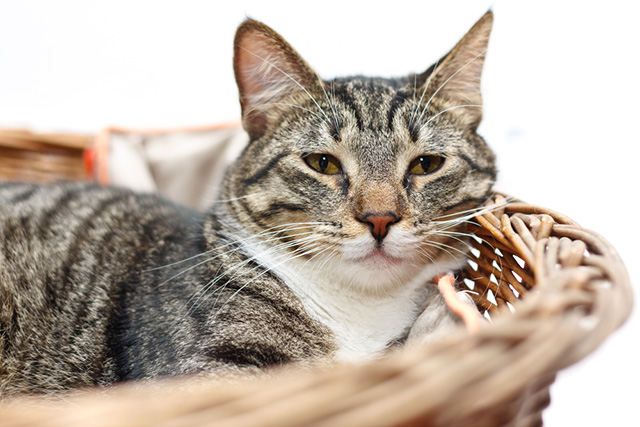Osteoarthritis in cats is treated in a variety of ways. Here are the most important ones:
Weight control for cats
Cats that suffer from chronic pain caused by conditions like osteoarthritis often become inactive, which can result in obesity. Controlling your cat’s weight will lighten the load on arthritic joints and make it less difficult to move around. Just as for humans, weight loss for animals involves both a well-balanced, calorie-reduced diet and regular exercise. Ask your veterinary surgeon for advice on the proper diet for your cat.

Cat exercise
Exercise is essential because it contributes to strengthening the muscles that support joints. Moderate amounts of daily, low-impact exercise also improves joint mobility and can help get a lethargic, arthritic pet active again. Cats can profit from play that keeps them moving without excessive jumping.
Consult your veterinary surgeon about what amount and type of exercise would be best for your pet. Also, be aware that your cat’s osteoarthritic pain may be more severe at certain times than others. If this is the case, let your pet take a break from his or her exercise routine for a few days, until the painful flare-up subsides.
Anti-inflammatory drugs
Anti-inflammatory drugs combat inflammation in the joints, thus relieving pain, increasing mobility, and protecting the joint from further damage. As joint pain may vary according to the amount of exercise, the weather or season, or for other, unknown factors, your veterinary surgeon may prescribe anti-inflammatory medication such as NSAIDs (non-steroidal anti-inflammatory drugs) as treatment.
Certain pain relief drugs prescribed for humans, such as paracetamol, can be fatal if given to a cat.
NSAIDs have a reputation for causing some serious side effects including bleeding of the gut wall which can prove disasterous.
NEVER give any drugs including pain relief and anti-inflammatory drugs designed and/or prescribed for use in humans or other species without proper veterinary advice. Modern preparations of NSAIDs specifically formulated for cats can prove to be especially effective in reducing inflammation and pain to improve mobility. These special cat NSAIDs prescribed by your veterinarian have a significantly reduced risk of side effects if used properly. An arthritic cat which needs long term treatment with NSAIDs should have a blood test to ensure that their kidneys are functioning properly before starting treatment Contact your veterinary surgeon for more information.
Physical therapy
In addition to the above, your veterinary surgeon may also suggest physical therapy, cold or hot packs and baths, massage or acupuncture as well as glucosamine/chondroitin and omega 3 and 6 diet supplements as an aid to maintaining joint health.
Surgery
Rarely, surgery may also be considered to achieve the best outcome.
Bedding
Thick and supportive bedding in a warm environment helps to alleviate the pain and stiffness associated with arthritis.
